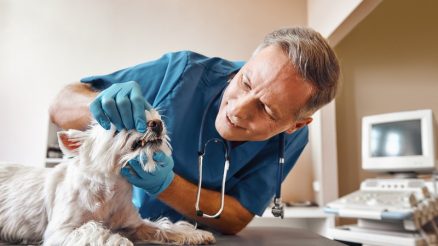As pet owners, we often focus on providing nutritious food, regular exercise, and love to ensure their well-being. However, dental care is one aspect of pet health that can sometimes be overlooked. It’s a valid question: can bad teeth affect my pet’s overall health? The simple answer is a resounding yes. In this article, we’ll explore the connections between poor dental health and the general health complications it can lead to in pets, alongside some professional insights into vet dentistry, the significance of pet vaccinations, and the care needed for puppies and kittens from vet perspectives.
The Link Between Dental Health and Overall Wellness
Like humans, a pet’s dental health is a gateway to overall health. Poor dental hygiene can lead to many issues, not just within the mouth but throughout the body.
-
Periodontal Disease: The most common dental condition in dogs and cats is periodontal disease, where plaque and tartar build-up leads to inflammation and can result in tooth loss, infection, and pain.
-
Systemic Effects: Bacteria from the mouth can enter the bloodstream through diseased gums, potentially affecting the heart, liver, and kidneys.
-
Weight Loss and Malnutrition: Dental pain can decrease appetite, leading to weight loss and malnutrition.
Spotting the Signs of Dental Problems
Detecting dental issues early can make a massive difference in the management and outcome of dental diseases. Here’s what to watch for:
-
Bad Breath: While a pet’s breath isn’t expected to smell fresh, overly foul breath can be a sign of dental disease.
-
Difficulty Eating: Pain or discomfort may lead pets to eat slowly, chew on one side, or avoid eating altogether.
-
Visible Tartar and Discoloration: Yellow or brown build-up near the gumline is a clear indicator of tartar.
-
Gum Inflammation: Red, swollen gums are a gingivitis and periodontal disease symptom.
Understanding the significance of dental health, professional vet care becomes indispensable. This brings us to the importance of pet dental cleaning. Regular dental checkups by a veterinarian can help catch dental issues early and manage existing conditions effectively. During a dental checkup, the vet can thoroughly examine your pet’s mouth and might suggest a dental cleaning. This procedure usually involves scaling (to remove plaque and tartar) and polishing, which can significantly reduce the risk of periodontal disease and its complications.
Integrating Dental Care into Routine Wellness
Professional care works best when complemented by home dental care routines. Here are a few simple steps you can take:
-
Introduce regular brushing with pet-safe toothpaste.
-
Offer dental chews that are designed to help clean the teeth.
-
Consider dental diets specially formulated to promote oral health.
While focusing on dental care, it’s equally important to remember the role of vaccinations in a pet’s overall health plan. Vaccinations protect pets from infectious diseases, some of which can affect the mouth and teeth. To ensure your pet is up-to-date with their vaccinations, look into services that offer their pet vaccinations services, ensuring your companion stays protected against preventable diseases.
Vet Dentistry and Its Growing Importance
The field of vet dentistry has seen remarkable advancements in recent years. Like human dentists, veterinary dentists specialize in dental care for animals, understanding the unique challenges and needs of pet oral health. They can perform various procedures, from simple cleanings to complex surgeries such as tooth extractions and correcting dental malformations. Therefore, selecting a vet that offers comprehensive dental services should be a priority for pet owners.
Caring for the Little Ones
Puppies and kittens require meticulous care right from the start, including their oral health. Finding a vet that caters to the young is crucial because early experiences with dental care can set the tone for a lifetime of health. Understanding the basics of puppy and kitten care, including dental health, can be daunting for new pet owners. Therefore, click here for more information about puppy and kitten vet services, which can be a valuable resource for navigating those early days.
Common Dental Procedures for Pets
In the realm of pet dentistry, several procedures are routinely performed to address dental issues:
-
Teeth Cleaning: Removal of plaque and tartar from teeth.
-
Extractions: Removal of teeth that are severely diseased.
-
Dental X-rays: Help in diagnosing hidden dental problems.
The Cost of Neglecting Dental Health
Neglecting your pet’s dental health can lead to costly and complex health issues. In addition to the systemic health problems mentioned, untreated dental conditions can result in expensive treatments and surgeries. Thus, investing in regular dental care and checkups is financially prudent and beneficial for your pet’s overall quality of life.
Tips for Choosing the Right Veterinary Dentist
Choosing the right veterinary dentist for your pet is critical. Here are some tips to consider:
-
Look for vets with specialized training or certification in dental care.
-
Ask about the dental services offered and their approach to preventive care.
-
Consider the vet’s experience with pets of similar breeds or specific dental issues your pet might face.
Final Thoughts
In conclusion, bad teeth can affect your pet’s overall health directly and indirectly. From systemic illnesses triggered by dental disease to the discomfort and pain associated with poor dental hygiene, the importance of dental care cannot be overstated. By incorporating regular dental checkups and cleanings into your pet’s healthcare regimen, alongside proper home care and attention to vaccinations, you can ensure that your pet leads a happier, healthier life. Remember, a healthy mouth contributes significantly to the overall well-being of your beloved companion.





